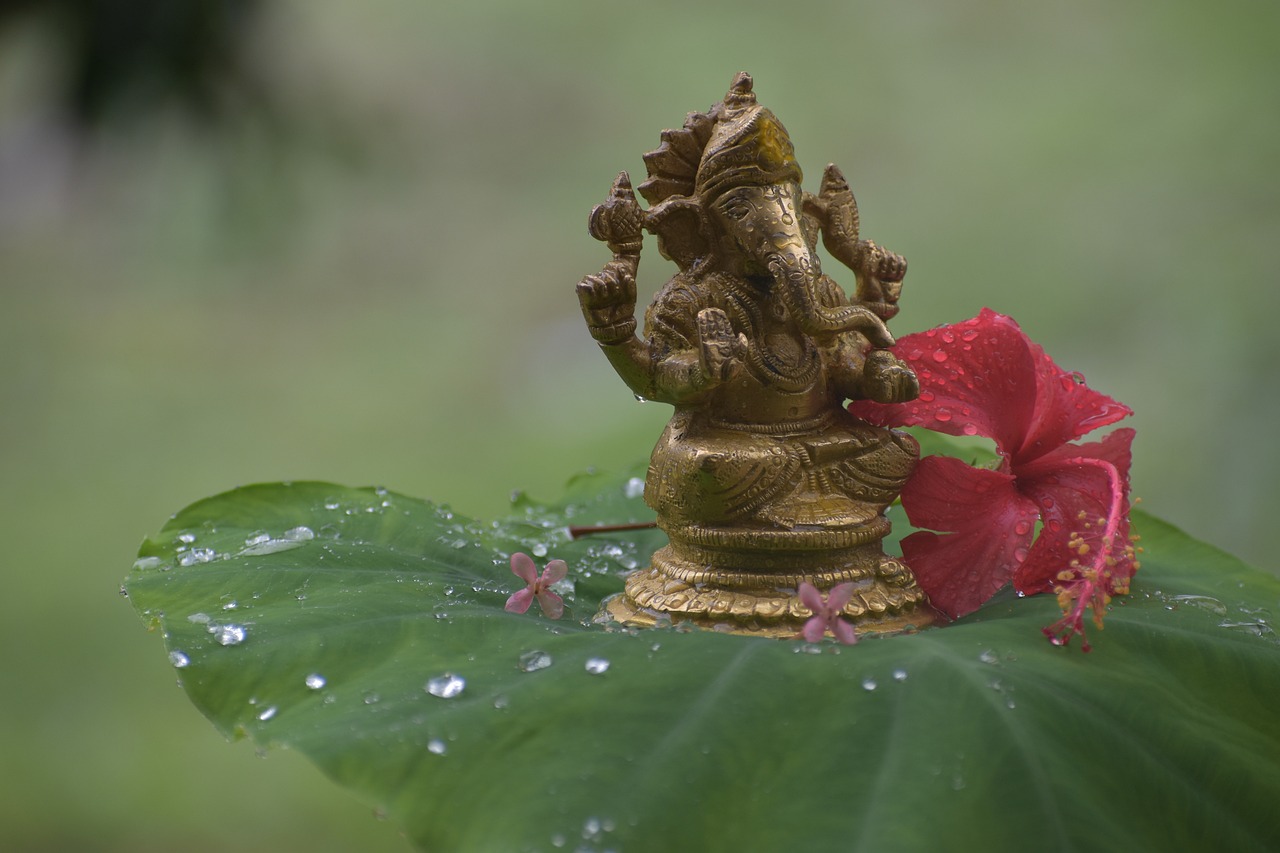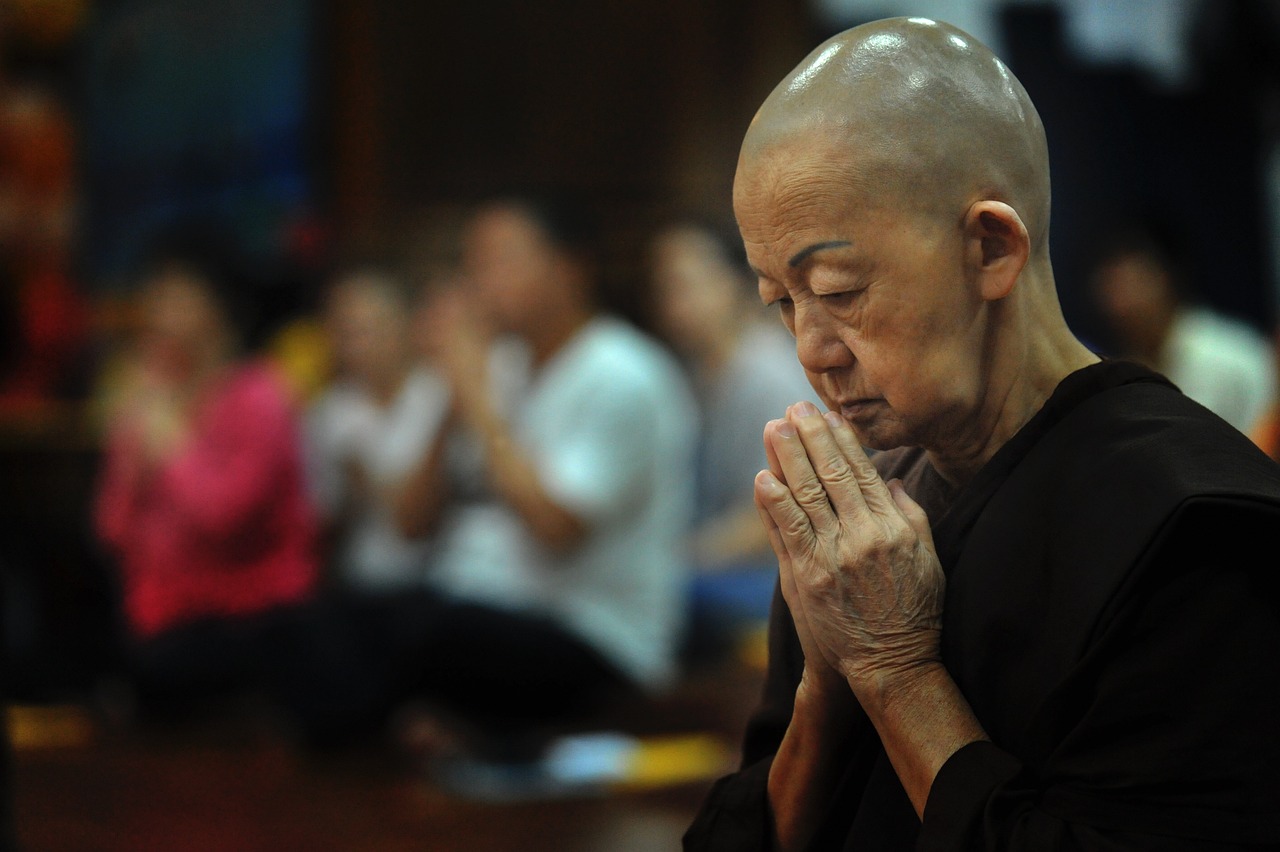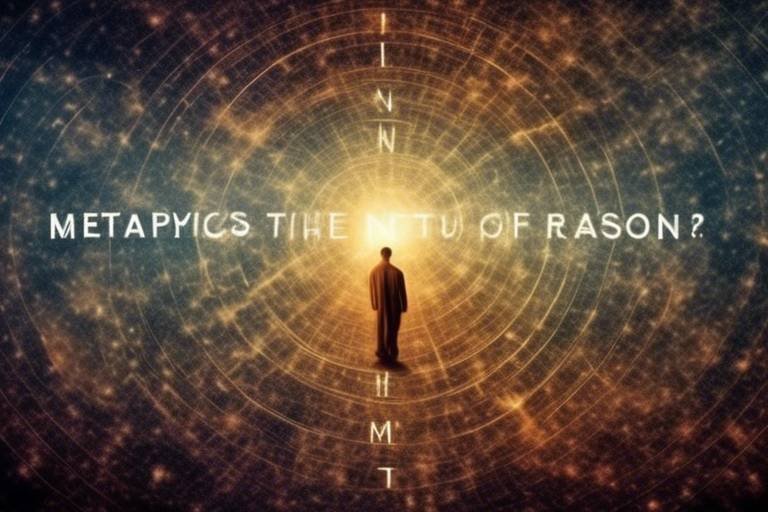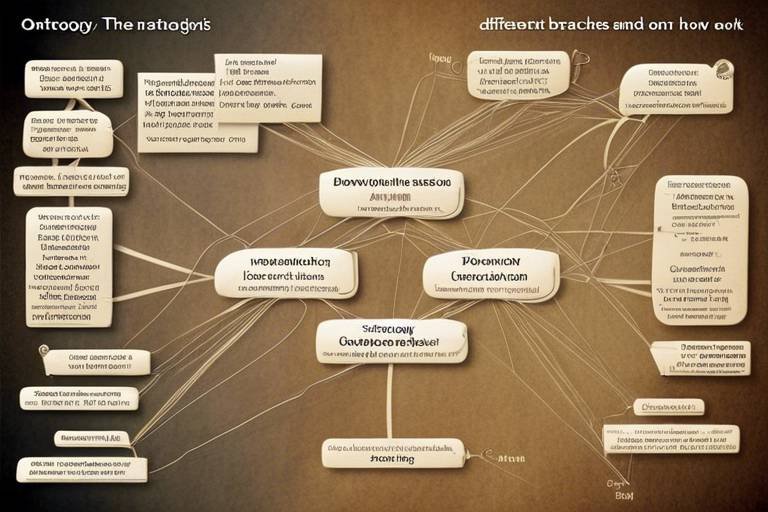Unraveling Ontology in Eastern and Western Thought
Ontology is a fascinating and intricate branch of philosophy that deals with the very essence of being and existence. It's like peeling back the layers of an onion, revealing the core truths about what it means to exist. In both Eastern and Western traditions, ontology forms the backbone of philosophical inquiry, yet the approaches and conclusions can be strikingly different. This article aims to take you on a journey through these two rich landscapes of thought, exploring how they converge and diverge in their understanding of reality, self, and the universe.
So, why does ontology matter? Well, understanding the nature of existence can profoundly influence how we perceive our lives and our place in the cosmos. Imagine standing at the intersection of two roads, each leading to a different understanding of life. One path is paved with the insights of Eastern philosophies, rich in spirituality and interconnectedness, while the other is grounded in the rational and analytical traditions of the West. Each offers unique perspectives that can enrich our understanding of ourselves and the world around us.
As we delve deeper into the topic, we'll unpack the historical developments of ontology in both traditions. We'll explore the fundamental principles that define these philosophies and how they have evolved over time. Along the way, we’ll highlight key figures and concepts that have shaped these discussions, providing a comprehensive overview that is both engaging and enlightening.
By the end of this exploration, you’ll not only have a clearer understanding of ontology but also a greater appreciation for the diverse ways in which humanity seeks to comprehend existence. So, buckle up as we embark on this intellectual adventure, unraveling the threads of ontology woven through Eastern and Western thought!
- What is ontology?
Ontology is the philosophical study of the nature of being, existence, and reality.
- How does Eastern ontology differ from Western ontology?
Eastern ontology often emphasizes interconnectedness and spirituality, while Western ontology tends to focus on individualism and rational analysis.
- Why is the study of ontology important?
Understanding ontology can help us better grasp our existence and our relationship with the universe.

Defining Ontology
Ontology, at its core, is the philosophical study of being, existence, and the nature of reality. It poses questions that many of us ponder, often without even realizing it: What does it mean to exist? What is the nature of objects, and how do they relate to one another? These inquiries have intrigued thinkers across cultures and eras, shaping the very foundations of philosophy. Historically, ontology has evolved significantly, influenced by various intellectual movements and cultural contexts.
To fully grasp ontology, we must consider its roots. The term itself originates from the Greek words "ontos," meaning "being," and "logia," meaning "study." Thus, ontology can be understood as the study of being. It encompasses various aspects such as the classification of entities, the relationships between them, and the principles that govern their existence. While Western philosophy often emphasizes a more analytical approach to ontology, Eastern philosophies introduce a more holistic perspective.
In Western thought, ontology has been primarily concerned with categorizing the different kinds of entities that exist. This often leads to the creation of ontological categories, which can be summarized as follows:
- Objects: Physical entities that we can perceive through our senses.
- Properties: Attributes or qualities that objects possess.
- Relations: How objects interact or connect with one another.
These categories help philosophers articulate their theories about existence and provide a framework for discussing complex ideas. For instance, when we consider whether abstract concepts like numbers exist, we delve into the realm of ontology. Are they merely human constructs, or do they possess an independent existence? Such questions highlight ontology's relevance in various fields, from mathematics to metaphysics.
Eastern philosophies, on the other hand, often approach ontology with a focus on interconnectedness and the nature of self. In traditions like Hinduism and Buddhism, the concept of existence is not merely about individual entities but rather about the relationships and interdependencies that define our reality. This perspective challenges the Western notion of a separate, individual self, proposing instead that existence is a web of interactions and experiences.
As we explore ontology further, it becomes clear that this field of study is not just an abstract exercise in philosophy. It has profound implications for how we understand our lives, our identities, and our place in the universe. By examining the nature of being, we can gain insights into our own existence and the connections we share with others and the world around us.

Eastern Perspectives on Ontology
When we dive into the rich tapestry of Eastern philosophical traditions, such as Hinduism and Buddhism, we encounter a profound and intricate understanding of ontology. These perspectives offer a refreshing contrast to Western thought, often emphasizing the fluidity of existence and the interconnectedness of all beings. In Eastern philosophy, the exploration of being is not merely an abstract exercise; it is deeply woven into the fabric of daily life and spiritual practice. Here, reality is seen as a dynamic interplay of forces rather than a static set of entities. This nuanced approach invites us to reconsider our own understanding of existence and identity.
Hinduism, with its vast and diverse traditions, presents a particularly complex ontological framework. Central to this framework are the concepts of Brahman and Atman, which offer unique insights into the nature of reality and the self. Brahman is often described as the ultimate, unchanging reality that underlies all existence. It is the source from which everything emanates and to which everything returns. This idea can be likened to a vast ocean, where individual waves (representing individual beings) rise and fall yet remain part of the same body of water. Understanding Brahman encourages individuals to see beyond their superficial identities and recognize their connection to a greater whole.
On the other hand, Atman represents the individual self or soul. In Hindu ontology, Atman is not separate from Brahman; rather, it is a manifestation of the same ultimate reality. This relationship can be seen as a beautiful dance of unity in diversity. Just as individual notes contribute to a symphony, each Atman plays a vital role in the grand orchestration of existence. This perspective challenges the often rigid notions of individuality prevalent in Western thought, suggesting instead that our true essence is intertwined with the cosmos.
Moving to Buddhism, we encounter a distinctive approach to ontology that emphasizes impermanence and the concept of non-self. Unlike the fixed notions of identity found in many Western philosophies, Buddhism teaches that all things are in a constant state of flux. This is encapsulated in the doctrine of Anatta, or non-self, which asserts that the self is an illusion. Imagine trying to grasp water with your hands; the more you try to hold on, the more it slips away. This analogy illustrates the Buddhist view that clinging to a permanent self leads to suffering. Instead, by embracing the idea of impermanence, individuals can find liberation and a deeper understanding of their place in the universe.
In summary, Eastern perspectives on ontology invite us to rethink our assumptions about existence and identity. By exploring the interconnectedness of all beings through the lenses of Hinduism and Buddhism, we can gain a richer understanding of reality that transcends mere materialism. These philosophies encourage us to look beyond the surface and recognize the profound unity that underlies the diversity of life. As we continue to navigate our own journeys, perhaps we can carry these insights with us, fostering a deeper sense of connection to ourselves and the world around us.
- What is the significance of Brahman in Hindu ontology?
Brahman is considered the ultimate reality in Hindu philosophy, serving as the source of all existence and a foundation for understanding the interconnectedness of life.
- How does Buddhism approach the concept of self?
Buddhism teaches the notion of Anatta, or non-self, which suggests that the self is an illusion and emphasizes the importance of understanding impermanence.
- What can we learn from Eastern ontological perspectives?
Eastern philosophies encourage us to see beyond individual identities and recognize our interconnectedness with the universe, fostering a sense of unity and compassion.

Hindu Ontology
Hindu ontology presents a fascinating tapestry of ideas that delve deep into the nature of existence, self, and the universe. At the heart of this philosophical framework are two pivotal concepts: Brahman and Atman. These ideas not only shape the understanding of reality in Hindu thought but also influence the way individuals perceive their place within the cosmos. To appreciate the intricacies of Hindu ontology, we must first explore the essence of Brahman and Atman, as well as their interrelation.
Brahman, in Hindu philosophy, is often described as the ultimate reality or the cosmic spirit that pervades everything. It is beyond form, time, and space, eluding precise definition. Imagine Brahman as the vast ocean, encompassing all waters, yet remaining untouched by the waves that form upon its surface. This metaphor illustrates how Brahman serves as the foundation for all existence, transcending individual identities while simultaneously being the source of them. The implications of Brahman for individual identity are profound; understanding Brahman encourages individuals to recognize their interconnectedness with the universe and all living beings.
On the other hand, Atman refers to the individual self or soul, which is often viewed as a microcosm of Brahman. This relationship is beautifully captured in the phrase "Tat Tvam Asi," meaning "That Thou Art," which highlights the idea that the individual soul is not separate from the universal spirit. This notion fosters a sense of unity in diversity, where each Atman is a unique expression of the same underlying reality. It’s akin to viewing a single wave in the ocean; while it appears distinct and separate, it is fundamentally part of the ocean itself.
In Hindu ontology, the interplay between Brahman and Atman leads to a deeper understanding of existence. When one realizes that Atman is ultimately Brahman, it transforms the perception of individuality. Instead of viewing oneself as an isolated entity, one begins to see their existence as interconnected with all beings. This realization can lead to profound shifts in consciousness, encouraging compassion and empathy, as individuals recognize that harming another is, in essence, harming oneself.
Furthermore, Hindu ontology emphasizes the cyclical nature of existence through the concepts of reincarnation and Karma. Each Atman undergoes a journey through various lifetimes, shaped by the actions (Karma) of past lives. This cyclical perspective encourages individuals to live ethically, as every action has repercussions not just in this life, but across multiple existences. It’s a reminder that our choices matter, echoing through time and shaping the fabric of our reality.
In summary, Hindu ontology offers a rich and complex understanding of existence that is deeply rooted in the concepts of Brahman and Atman. By exploring these ideas, one can gain insights into the interconnectedness of all life and the nature of reality itself. It invites us to ponder the questions of who we are and what it means to exist, ultimately guiding us toward a more profound appreciation of the universe and our place within it.
- What is Brahman? - Brahman is considered the ultimate reality in Hindu philosophy, transcending all forms and identities.
- What is Atman? - Atman refers to the individual self or soul, which is seen as a part of Brahman.
- How do Brahman and Atman relate? - Atman is a microcosm of Brahman, suggesting that individual souls are ultimately connected to the universal spirit.
- What role does Karma play in Hindu ontology? - Karma emphasizes the cyclical nature of existence, where actions in one life affect future lives.

Concept of Brahman
The concept of Brahman is central to Hindu ontology and serves as the ultimate reality that transcends the material world. It is not merely a concept but a profound understanding that shapes the very fabric of existence. Imagine Brahman as the vast ocean, and everything in the universe as individual waves rising and falling upon its surface. Each wave, while distinct, is ultimately part of the same ocean, reflecting the idea that all beings are interconnected through Brahman.
Brahman is often described in various ways, emphasizing its ineffable nature. It is beyond human comprehension, and yet it is the essence of all that exists. This paradoxical quality of Brahman leads to several key attributes that are essential for understanding its role in Hindu philosophy:
- Sat - Existence: Brahman is the foundation of all existence, the source from which everything emerges.
- Chit - Consciousness: It embodies pure consciousness, the awareness that permeates all beings.
- Ananda - Bliss: Brahman is associated with ultimate bliss, representing the fulfillment that transcends worldly pleasures.
In essence, Brahman is not just a philosophical idea; it is the underlying reality that connects all aspects of life. This understanding invites individuals to look beyond their immediate experiences and recognize their place within the larger cosmos. The implications of Brahman extend to personal identity, as it challenges the notion of separation between the individual and the universe. In this light, one can begin to see the self (Atman) as a reflection of Brahman, leading to a profound realization of unity amidst diversity.
Furthermore, the exploration of Brahman encourages a transformative journey for individuals. It prompts questions about the nature of existence and the purpose of life, pushing one to seek deeper meaning. This quest can lead to spiritual practices such as meditation and self-inquiry, which aim to dissolve the illusion of separateness and foster a direct experience of Brahman. The realization that one’s true essence is not merely the individual self but part of a greater whole can be both liberating and enlightening.
In summary, the concept of Brahman in Hindu ontology serves as a cornerstone for understanding existence, identity, and the interconnectedness of all life. It invites individuals to explore the depths of their being, encouraging a journey toward spiritual awakening and unity with the cosmos.
- What is Brahman? - Brahman is the ultimate reality in Hindu philosophy, representing the source of all existence and consciousness.
- How does Brahman relate to individual identity? - Brahman is seen as the universal essence that connects all individual selves (Atman), emphasizing unity in diversity.
- Can one experience Brahman? - Yes, through spiritual practices such as meditation, individuals can experience a direct connection with Brahman.

Atman and Individuality
Atman, the individual self in Hindu philosophy, is a concept that resonates deeply with the notion of individuality. Unlike the Western idea of the self, which often emphasizes autonomy and separation, Atman embodies a profound connection to the universe and the ultimate reality, Brahman. This duality of existence—where individual identity is both unique and part of a greater whole—invites us to reconsider our perceptions of selfhood.
In Hindu thought, Atman is not merely a static entity; it is dynamic and ever-evolving. The journey of understanding Atman is akin to peeling layers of an onion, where each layer reveals deeper truths about our existence. As we delve into the essence of Atman, we come to realize that our individuality is interwoven with the cosmic fabric of life. This perspective challenges us to reflect on questions like: What does it mean to be truly individual in a world that is fundamentally interconnected?
To illustrate the relationship between Atman and Brahman, consider the following table:
| Concept | Description |
|---|---|
| Brahman | The ultimate, unchanging reality that is the source of all existence. |
| Atman | The individual self, which is a reflection of Brahman, embodying both uniqueness and universality. |
This understanding of Atman leads to the realization that our individuality is not a barrier but a bridge to the greater reality. When we acknowledge that Atman is a fragment of Brahman, we begin to see our lives as a part of a larger narrative—one that transcends personal desires and ego-driven pursuits. This perspective can be liberating, as it encourages us to cultivate compassion and empathy, recognizing that the struggles and joys of others are reflections of our own journey.
Moreover, the concept of Atman emphasizes the importance of self-realization. In the quest to understand our Atman, we embark on a spiritual journey that often involves practices such as meditation, yoga, and self-inquiry. These practices are not merely techniques for personal development; they are pathways to experiencing the unity of Atman and Brahman. As we delve deeper into our own consciousness, we may find that our individuality shines even brighter, illuminating our connection to all that exists.
In summary, Atman and individuality in Hindu philosophy invite us to embrace a more holistic understanding of self. Rather than viewing ourselves as isolated beings, we are encouraged to see our lives as part of a grand tapestry of existence. This realization not only enriches our personal lives but also fosters a sense of belonging and responsibility towards the world around us.
- What is Atman in Hindu philosophy? Atman refers to the individual self, which is considered a reflection of the ultimate reality, Brahman.
- How does Atman relate to individuality? Atman emphasizes that while each individual is unique, they are also interconnected with the universe, suggesting that individuality is part of a larger whole.
- What practices can help in understanding Atman? Practices such as meditation, yoga, and self-inquiry are commonly used to explore the nature of Atman and achieve self-realization.
- Why is understanding Atman important? Understanding Atman fosters compassion and empathy, helping individuals recognize their connection to others and the universe.

Buddhist Ontology
Buddhism offers a fascinating lens through which to view ontology, primarily through its emphasis on **impermanence** and the concept of **non-self**. Unlike many Western philosophies that often cling to the notion of a permanent self or essence, Buddhism challenges these ideas by suggesting that all phenomena are in a constant state of flux. This perspective can be quite liberating, as it encourages individuals to let go of rigid identities and embrace the fluidity of existence. Imagine a river: it’s never the same from one moment to the next, yet we still recognize it as a river. Similarly, our identities and experiences are ever-changing, shaped by countless factors that come and go.
At the heart of Buddhist ontology lies the **doctrine of Anatta**, or **non-self**, which posits that what we consider the 'self' is merely a collection of changing physical and mental components. This is quite a departure from the idea of a fixed, unchanging soul found in many other traditions. Instead, Buddhists argue that our sense of self is an illusion, a temporary aggregation of thoughts, feelings, and sensory experiences that arise and dissipate. This concept can be unsettling at first; after all, who are we if not our thoughts and experiences? However, it also opens up a pathway to profound **freedom**. By recognizing the impermanence of all things, including our identities, we can cultivate a sense of detachment and peace.
Furthermore, the Buddhist view of **dependent origination** illustrates how all phenomena arise in dependence on conditions and cease when those conditions change. This interconnectedness emphasizes that nothing exists in isolation; everything is part of a vast web of causality. For instance, consider how a flower blooms: it requires soil, sunlight, and water. Without any of these elements, the flower cannot exist. In the same way, our existence is contingent upon a myriad of factors, making it clear that we are all **interconnected**. This perspective not only reshapes our understanding of existence but also fosters a sense of compassion for others, as we recognize that we all share this transient journey together.
In summary, Buddhist ontology invites us to rethink our understanding of existence. By embracing the principles of impermanence and non-self, we can cultivate a more profound sense of freedom and interconnectedness with all beings. It’s a call to live in the present moment, appreciating the beauty of change and the richness of our experiences without being overly attached to any one aspect of our identity. This shift in perspective can lead to a more peaceful and fulfilling life, resonating with the core teachings of Buddhism.
- What is the main focus of Buddhist ontology?
The main focus of Buddhist ontology is on the concepts of impermanence and non-self, emphasizing that all phenomena are transient and that the self is an illusion.
- How does Buddhist ontology differ from Western thought?
Unlike many Western philosophies that posit a fixed essence or self, Buddhist ontology encourages the understanding of identity as fluid and contingent upon various conditions.
- What is dependent origination in Buddhism?
Dependent origination is the principle that all phenomena arise in dependence on conditions and cease when those conditions change, highlighting the interconnectedness of all existence.

Western Perspectives on Ontology
Western philosophy has a rich and intricate history that has shaped our understanding of ontology, the study of being and existence. From the ancient Greeks to modern existentialists, various thinkers have contributed unique perspectives that continue to influence contemporary thought. The journey through Western ontology is like navigating a complex labyrinth, where each philosopher adds a new layer of depth and understanding to the nature of reality.
One of the earliest and most significant figures in this exploration is Plato, whose theory of Forms posits that the material world is merely a shadow of a higher, non-material reality. According to Plato, these abstract Forms represent the most accurate depiction of existence. For instance, the Form of a tree is the perfect essence of 'tree-ness,' while all physical trees are just imperfect manifestations of that ideal. This idea has profound implications, suggesting that true knowledge comes from understanding these eternal Forms rather than relying solely on empirical observation. Plato’s influence is unmistakable, as his thoughts laid the groundwork for subsequent philosophical inquiry into the nature of reality.
In contrast, the modern philosopher Martin Heidegger revolutionized ontological discussions with his existential approach to being. Heidegger's work, particularly in his seminal text "Being and Time," shifts the focus from abstract entities to the lived experience of individuals. He introduces the concept of Dasein, which refers to the unique way humans exist in the world, characterized by awareness of their own being. This perspective emphasizes the importance of time, as Heidegger argues that understanding existence requires us to consider our temporal nature. In his view, being is not a static state but a dynamic process shaped by our experiences and relationships.
Heidegger’s exploration of being also leads to a critical examination of technology, modernity, and how they affect our understanding of existence. He warns that the technological worldview can obscure our relationship with being, reducing it to mere utility. This cautionary tale is particularly relevant today as we navigate a world increasingly dominated by technology. The challenge lies in reconnecting with the essence of being, which Heidegger believes is essential for authentic existence.
To further illustrate the evolution of ontological thought in the West, consider the following table that summarizes key figures and their contributions:
| Philosopher | Key Concept | Impact on Ontology |
|---|---|---|
| Plato | Theory of Forms | Introduced the idea of a higher reality beyond the physical world. |
| Aristotle | Substance and Essence | Focused on the nature of individual entities and their characteristics. |
| Heidegger | Dasein | Revolutionized the understanding of being through existential analysis. |
| Sartre | Existence Precedes Essence | Emphasized individual freedom and the absence of predetermined nature. |
As we can see, Western ontology is not a monolithic tradition but rather a vibrant tapestry woven from diverse threads of thought. Each philosopher contributes to a broader dialogue about the nature of existence, prompting us to ask profound questions about our place in the universe. Are we merely passive observers of reality, or do we actively shape our existence through our choices and experiences? These inquiries remain central to the ongoing exploration of ontology in contemporary philosophy.
- What is ontology?
Ontology is the branch of philosophy that studies the nature of being, existence, and reality. - How does Western ontology differ from Eastern ontology?
Western ontology often emphasizes individualism and abstract concepts, while Eastern ontology may focus on interconnectedness and the nature of self. - Who are some key figures in Western ontology?
Key figures include Plato, Aristotle, Martin Heidegger, and Jean-Paul Sartre, each contributing unique perspectives on existence.

Plato and Ideal Forms
When we dive into the realm of Plato's philosophy, we encounter a fascinating concept known as the Theory of Forms. Imagine a world where everything you see around you is just a shadow of a more perfect reality. This is the essence of Plato's thought. According to him, the physical world is merely a reflection of a higher, unchanging reality consisting of Ideal Forms. These Forms are the true essence of all things, representing their perfect versions. For instance, think about the concept of beauty; while you may see many beautiful objects, they are all imperfect representations of the ideal Form of Beauty itself.
Plato proposed that these Ideal Forms exist in a non-material realm, accessible only through philosophical reasoning and intellectual insight. This notion challenges us to reconsider how we perceive reality. Instead of accepting the physical world as the ultimate truth, Plato invites us to seek the underlying Forms that define the essence of everything. This perspective has profound implications for how we understand existence and knowledge. It raises questions like: Are our perceptions reliable? Can we ever truly know the essence of something?
In Plato's view, the journey towards understanding these Forms is not just academic; it's a transformative experience. He believed that knowledge is a recollection of the Forms, suggesting that our souls have encountered these perfect realities before being incarnated in the physical world. This idea resonates with many, as it implies that we all possess an innate understanding of the true nature of things, waiting to be awakened.
To illustrate the impact of Plato's Theory of Forms, let's consider a simple table that highlights its key aspects:
| Aspect | Description |
|---|---|
| Ideal Forms | Non-material, perfect representations of concepts. |
| Physical World | A mere shadow or reflection of the Ideal Forms. |
| Knowledge | Recollection of the Ideal Forms; an intellectual journey. |
| Reality | Divided into the world of appearances and the world of Forms. |
Plato's influence extends beyond philosophy; it has shaped various fields such as art, science, and politics. His ideas challenge us to question the nature of reality and our place within it. Are we merely observers of a flawed world, or can we aspire to grasp the ideal? This inquiry is not just philosophical; it touches upon our daily lives, influencing how we pursue knowledge, beauty, and truth.
In summary, Plato's Theory of Forms compels us to look beyond the surface of our experiences. It encourages a deeper understanding of existence, urging us to seek out the perfect ideals that underpin our reality. As we navigate through life, pondering these questions can lead to a richer, more meaningful existence. So, the next time you encounter something beautiful or profound, ask yourself: what is the Ideal Form behind this experience?

Heidegger and Being
Martin Heidegger, a pivotal figure in 20th-century philosophy, profoundly transformed how we think about ontology, particularly through his seminal work, Being and Time. His exploration of the concept of Being invites us to reconsider the very essence of existence. Heidegger argues that our understanding of Being is not merely an abstract inquiry; rather, it is rooted in our everyday experiences and interactions with the world around us. This perspective is revolutionary because it shifts the focus from a detached analysis of existence to a more engaged and personal understanding.
At the heart of Heidegger's philosophy is the notion of Dasein, which translates to "being-there." Dasein refers to the unique way humans exist in the world, characterized by their ability to reflect on their own existence. Heidegger posits that Dasein is fundamentally different from other beings because it possesses an awareness of its own Being. This self-awareness leads to existential questions that challenge us to consider our purpose and the nature of our existence. In this way, Heidegger's thoughts resonate deeply with contemporary concerns about identity and meaning, making his ideas remarkably relevant today.
One of the key insights Heidegger offers is the concept of Being-in-the-world. This idea emphasizes that we are not isolated entities but rather are always situated within a specific context that shapes our experiences. Our relationships, environment, and history play crucial roles in how we understand ourselves and our existence. Heidegger suggests that to grasp the essence of Being, we must acknowledge our interconnectedness with the world and others. This perspective challenges the traditional Western notion of the individual as a separate, autonomous being and instead highlights the importance of community and shared experience.
Heidegger also introduces the idea of thrownness, which refers to the fact that we find ourselves in a world we did not choose, filled with circumstances that shape our existence. This concept raises profound questions about freedom and responsibility. Are we merely products of our environment, or do we have the agency to shape our own destinies? Heidegger argues that while we are thrown into our circumstances, we also have the capacity to make choices that define our existence. This tension between being thrown and exercising freedom is a central theme in existential philosophy.
Moreover, Heidegger's exploration of time is crucial to understanding his ontological framework. He posits that our experience of time is not linear but rather a complex interplay of past, present, and future. This notion of temporality suggests that our understanding of Being is always in flux, influenced by our memories and aspirations. It challenges the static notions of existence that have dominated much of Western philosophy, inviting us to embrace the dynamic nature of life.
In summary, Martin Heidegger's contributions to ontology are profound and multifaceted. His emphasis on Dasein, Being-in-the-world, thrownness, and temporality invites us to engage with our existence in a more meaningful way. By understanding that our Being is intertwined with our experiences and relationships, we can better navigate the complexities of modern life. Heidegger's ideas not only challenge traditional philosophical notions but also resonate deeply with the existential questions we face today, making his work an essential part of contemporary philosophical discourse.
- What is Dasein in Heidegger's philosophy? Dasein refers to the unique way humans exist in the world, characterized by self-awareness and the ability to reflect on one's existence.
- How does Heidegger's concept of Being differ from traditional views? Heidegger emphasizes that Being is not an abstract concept but is rooted in our everyday experiences and relationships with the world.
- What role does time play in Heidegger's ontology? Heidegger argues that our understanding of Being is influenced by our experiences of past, present, and future, highlighting the dynamic nature of existence.

Being
This article explores the fundamental concepts of ontology as understood in Eastern and Western philosophies, examining their differences, similarities, and implications for contemporary thought.
Ontology is the branch of philosophy concerned with the nature of being and existence. This section delves into its core principles, tracing its historical development in both Eastern and Western contexts.
Eastern philosophical traditions, including Hinduism and Buddhism, offer unique insights into ontology. This section examines how these perspectives shape understanding of reality, self, and the universe.
Hinduism presents a complex ontological framework, emphasizing concepts like Brahman and Atman. This subsection explores how these ideas influence the perception of existence and interconnectedness.
Brahman, as the ultimate reality in Hindu philosophy, serves as a foundation for understanding existence. This section discusses its implications for individual identity and universal consciousness.
Atman, the individual self, plays a crucial role in Hindu ontology. This subsection examines the relationship between Atman and Brahman, highlighting the notion of unity in diversity.
Buddhism presents a distinctive approach to ontology, focusing on impermanence and non-self. This section analyzes how these concepts challenge traditional notions of existence and identity.
Western philosophy has a rich history of ontological thought, from ancient Greece to modern existentialism. This section explores key figures and ideas that have shaped Western ontology.
Plato's theory of Forms posits that non-material abstract forms represent the most accurate reality. This subsection examines its impact on Western thought and the nature of existence.
Martin Heidegger's exploration of revolutionized ontological discussions. His work invites us to ponder the very essence of existence itself, challenging us to look beyond the surface of daily life. Heidegger argued that to understand , one must confront the question of what it means to exist. He famously stated, “Being is not something that can be defined; rather, it is something we must experience.” This perspective shifts the focus from abstract definitions to the lived experience of individuals.
Heidegger introduced the concept of “Dasein,” which refers to the experience of being that is unique to humans. Dasein emphasizes our capacity for self-reflection and awareness, positioning humans as beings that are aware of their own existence and the passage of time. This leads to profound implications for how we perceive our lives and our place in the universe. Instead of viewing existence as a static condition, Heidegger encourages us to see it as a dynamic process filled with possibilities.
Moreover, Heidegger's notion of “Being-toward-death” highlights the importance of mortality in shaping our understanding of existence. By acknowledging our finite nature, we can live more authentically and fully. This idea resonates deeply in contemporary discussions about purpose and meaning, inviting individuals to embrace their existence with urgency and intention.
In summary, Heidegger's exploration of invites us to rethink our relationship with existence. It challenges us to move beyond mere survival and to engage actively with the world around us. Through this lens, we can appreciate the richness of our experiences and the interconnectedness of all beings.
- What is ontology? Ontology is the philosophical study of the nature of being, existence, and reality.
- How do Eastern and Western ontologies differ? Eastern ontologies often emphasize interconnectedness and the nature of self, while Western ontologies focus on individual existence and abstract concepts.
- Who is Martin Heidegger? Martin Heidegger was a German philosopher whose work on Being significantly influenced modern philosophy.
- What is Dasein? Dasein is a term used by Heidegger to describe the experience of being that is unique to human beings.

revolutionized ontological discussions. This section delves into his ideas about existence, time, and the human experience, highlighting their relevance today.
Martin Heidegger, a towering figure in 20th-century philosophy, fundamentally revolutionized ontological discussions with his groundbreaking work, particularly in his seminal text, Being and Time. Heidegger's exploration of the concept of "Being" was not just an abstract inquiry; it was a profound examination of what it means to exist. He posed questions that seemed simple yet were deeply complex: What does it mean to be? How do we understand our existence in a world that is constantly changing? These inquiries led to an entirely new way of thinking about existence, one that emphasizes our relationship with time and the human experience.
At the heart of Heidegger's philosophy is the idea that our understanding of Being is intricately linked to our experience of time. He argued that human existence is not a static state but rather a dynamic process that unfolds over time. This perspective challenges the traditional notion of existence as a mere presence in the world. Instead, Heidegger invites us to consider our lives as a series of moments, each contributing to our understanding of who we are. He famously coined the term “Dasein”, which translates to "being-there," to describe the unique way humans engage with their surroundings and their own existence.
Heidegger’s exploration of Dasein reveals several key ideas:
- Being-in-the-World: Heidegger posited that humans are not isolated beings but exist in a world filled with relationships and connections. Our identity is shaped by our interactions with others and our environment.
- Temporal Existence: He emphasized that our understanding of ourselves is rooted in our past experiences and future possibilities. Time is not just a linear progression but a fundamental aspect of our existence.
- Authenticity: Heidegger encourages individuals to confront their own existence authentically, acknowledging their own mortality and the choices that define their lives.
These ideas are not just philosophical musings; they resonate with contemporary discussions about identity and existence. In a world where technology and social media often create a façade of connection, Heidegger's emphasis on authentic existence challenges us to reflect on our true selves. Are we living authentically, or are we merely existing in a digital echo chamber? His thoughts on time compel us to consider how our past shapes our present and how our aspirations influence our future. In essence, Heidegger's philosophy serves as a mirror, reflecting our struggle with existence and the quest for meaning in an ever-changing world.
In today’s fast-paced society, where the pressure to conform can be overwhelming, Heidegger’s insights encourage a return to introspection. By understanding our existence through the lens of time and authenticity, we can navigate the complexities of modern life with a clearer sense of purpose. Whether in personal relationships, career choices, or self-identity, embracing Heidegger's philosophy can lead to a more fulfilling life.
- What is the main focus of Heidegger's philosophy? Heidegger's philosophy primarily focuses on the concept of Being and how it relates to human existence, time, and authenticity.
- How does Heidegger's concept of Dasein influence our understanding of existence? Dasein emphasizes that human beings are fundamentally connected to the world around them, shaping their identity through interactions and experiences.
- Why is Heidegger's work relevant today? Heidegger's insights into authenticity and temporal existence resonate in contemporary discussions about identity, technology, and the search for meaning in a fast-paced world.
Frequently Asked Questions
- What is ontology?
Ontology is the branch of philosophy that deals with the nature of being and existence. It explores questions about what entities exist and how they can be categorized and related within a hierarchy of existence.
- How does Eastern philosophy approach ontology?
Eastern philosophies, particularly Hinduism and Buddhism, offer distinct perspectives on ontology. Hinduism emphasizes concepts like Brahman (the ultimate reality) and Atman (the individual self), while Buddhism focuses on impermanence and the notion of non-self, challenging traditional views of fixed identity.
- What is the significance of Brahman in Hindu ontology?
Brahman is considered the ultimate reality in Hindu philosophy and serves as a foundation for understanding existence. It shapes the perception of individual identity and universal consciousness, suggesting that everything is interconnected.
- What role does Atman play in Hindu thought?
Atman represents the individual self in Hindu ontology. Its relationship with Brahman underscores the idea of unity in diversity, highlighting that while individuals may seem separate, they are fundamentally connected to a greater reality.
- How does Buddhism redefine existence?
Buddhism challenges traditional notions of existence by emphasizing impermanence and the concept of non-self. It suggests that clinging to a fixed identity leads to suffering, and understanding the transient nature of life can lead to enlightenment.
- What are the key ideas in Western ontology?
Western ontology has evolved through various philosophical movements, from Plato's theory of Ideal Forms, which posits that non-material abstract forms represent true reality, to Heidegger's exploration of Being, which focuses on existence, time, and human experience.
- How did Plato influence Western thought on ontology?
Plato's theory of Ideal Forms has profoundly impacted Western thought, suggesting that the physical world is merely a shadow of the true reality represented by these abstract forms. This idea has influenced subsequent philosophical discussions about existence and reality.
- What is Martin Heidegger's contribution to ontology?
Martin Heidegger revolutionized ontological discussions by exploring the concept of Being. He examined how our understanding of existence is intertwined with time and human experience, emphasizing the importance of being aware of our own existence in the world.



















